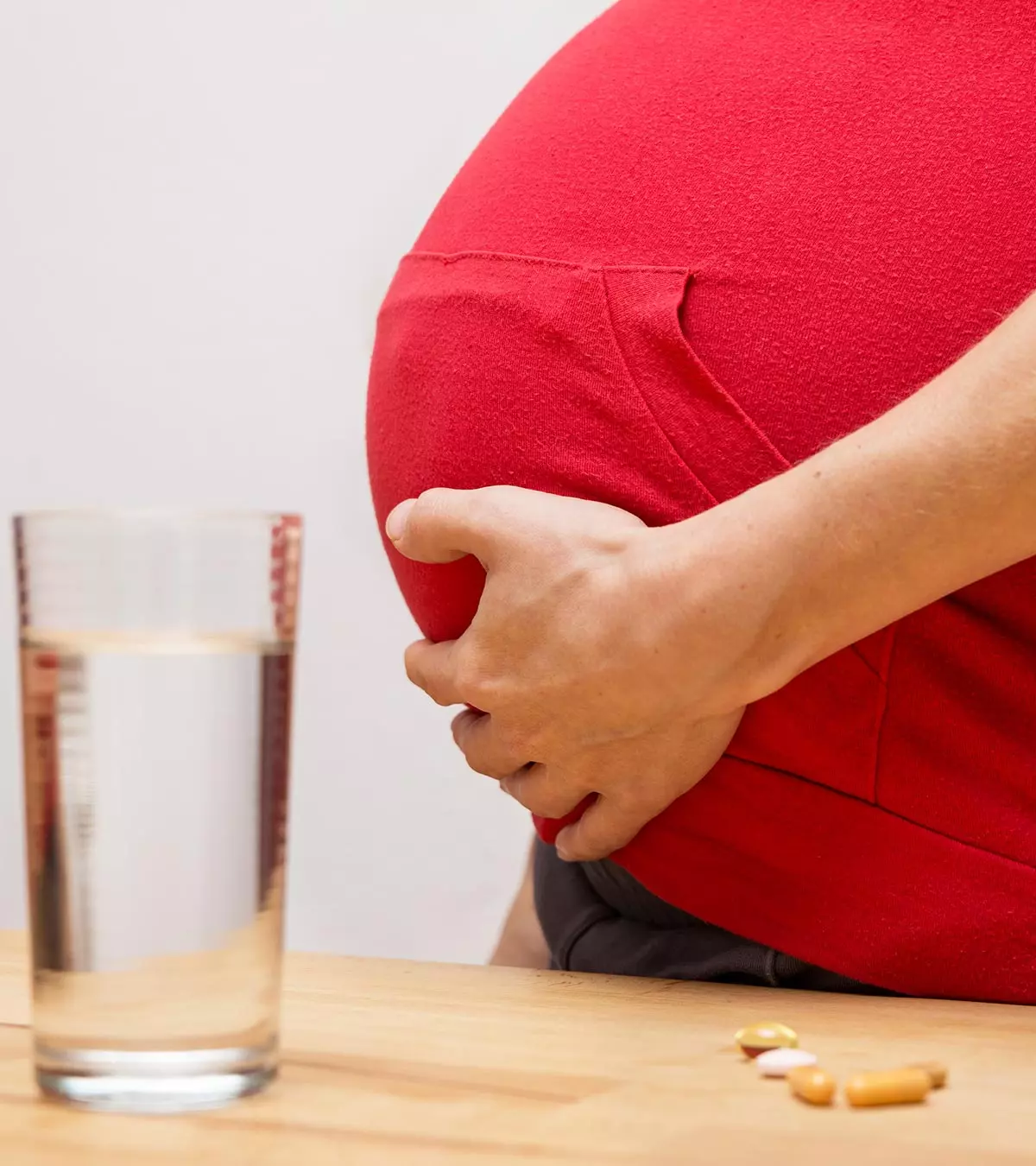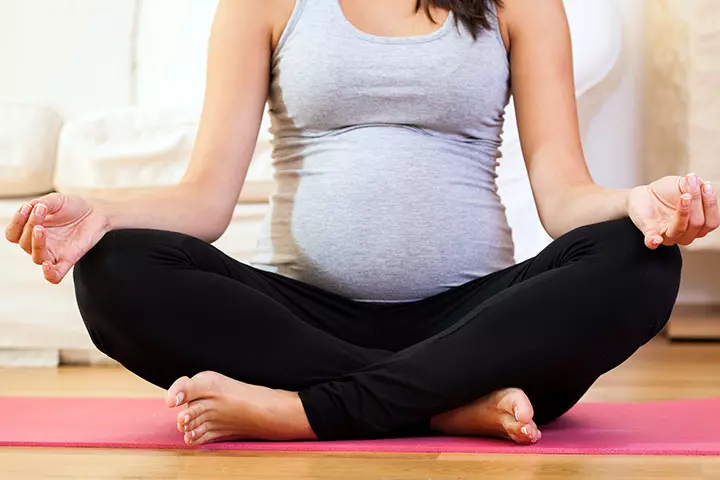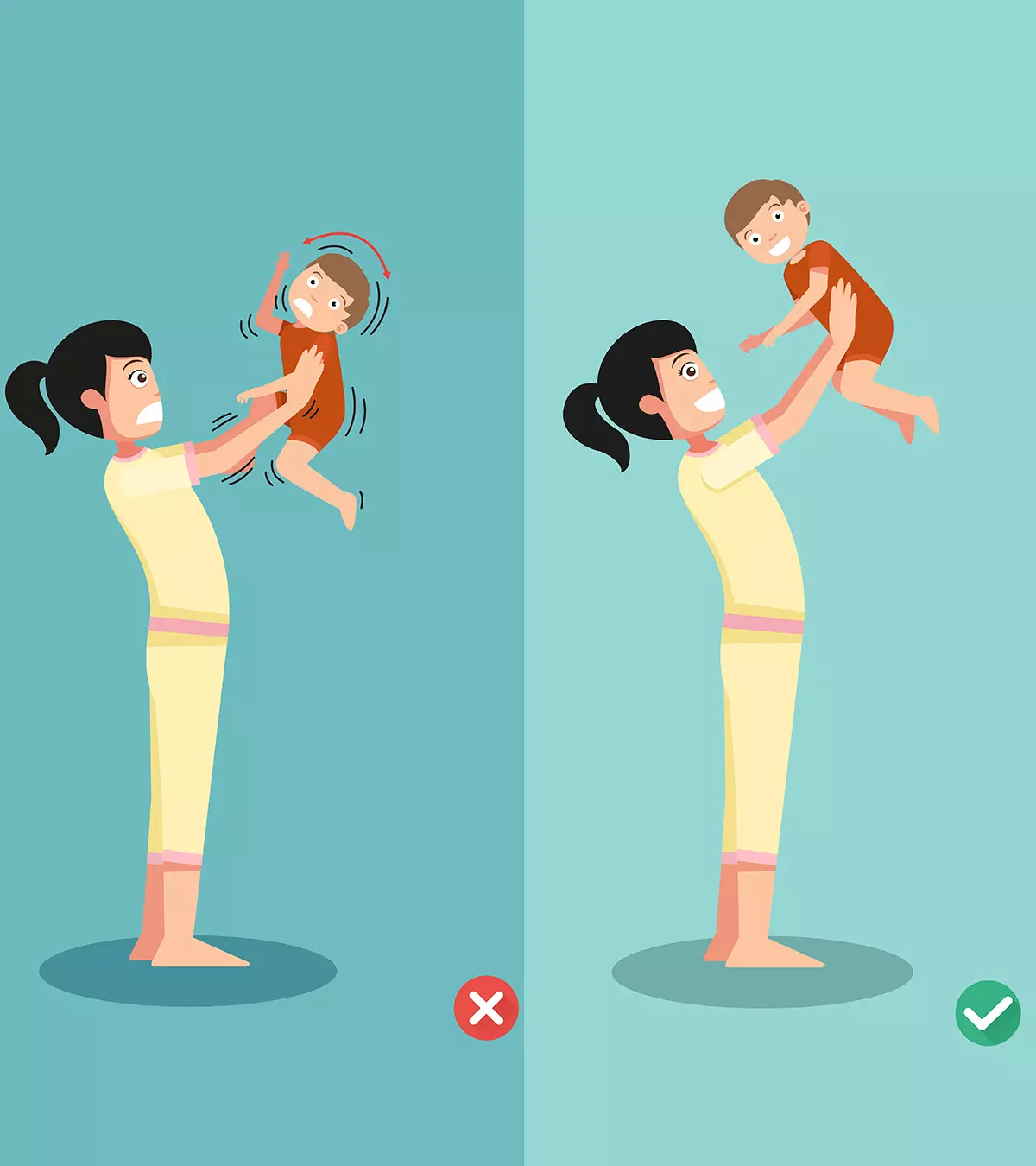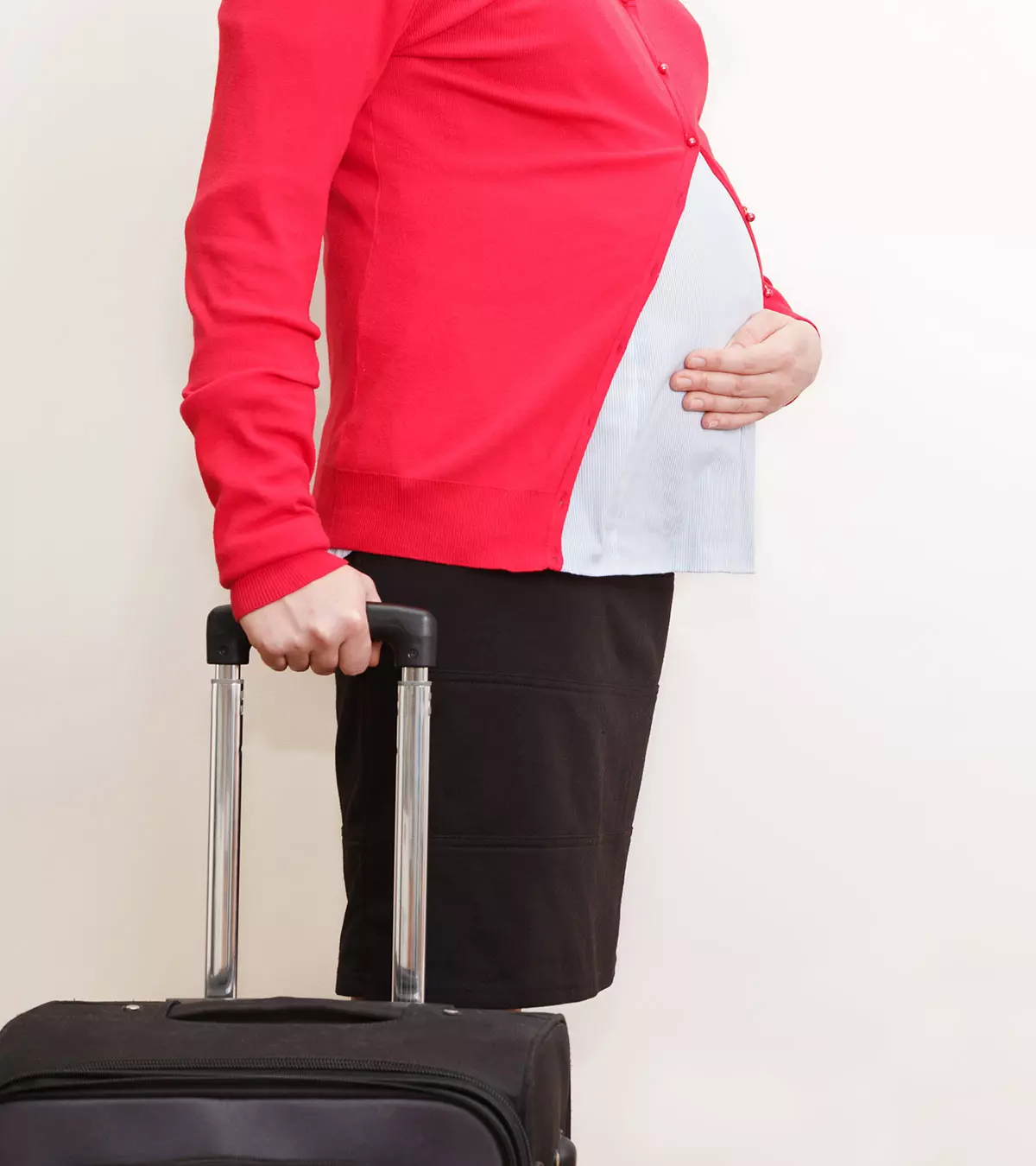
Image: Momjunction Design Team
Sleeping positions are a personal preference, and many of us are habituated to sleeping in a prone position. However, when your tummy starts growing to accommodate your developing baby, it may not feel comfortable to sleep on your stomach during pregnancy. You may not notice any difference in the first trimester or even up to 18 weeks, but your baby bump at later stages may make it a painful experience. Read this post to know when to stop sleeping on your tummy when pregnant, the ideal sleep position, and some useful tips to help you sleep better.

Key Pointers
- The second and third trimesters of pregnancy can make sleeping on the stomach uncomfortable.
- If sleeping on the stomach is a habit during pregnancy, a pregnancy pillow may be helpful.
- It is advised to sleep on the left side during pregnancy as it promotes better blood flow and kidney function.
- Yoga, breathing exercises, and staying hydrated can reduce stress and minimize sleep disruptions.
- In addition, taking a warm shower and listening to calming music could also improve sleep quality.
Can You Sleep On Your Stomach When Pregnant?
Sleeping on your stomach may not be a good option during pregnancy. As the pregnancy progresses, the uterus becomes heavier, making it uncomfortable for you to sleep in that position.
- First trimester: If you are a stomach-sleeper, you may continue to sleep in the first trimester (1). However, some sleeping on their stomach might make some mothers uncomfortable even during the first trimester. Michelle Carvalho, a mother of two who is eight weeks pregnant, describes her struggles when trying to sleep on her stomach at this stage. She says, “I am a stomach sleeper. I love to lay flat on my stomach with one leg up. Having a large beach-ball-shaped belly prevents me from doing that. Even at the beginning of this pregnancy, it kind of hurts to sleep on my stomach (i).”
- Second trimester: During the second trimester, you may start experiencing heartburn, which occurs when the stomach contents reflux or flow back to the esophagus. Sleeping on the stomach while pregnant may also slow down the digestion process, keeping the food in the stomach for a longer time, which could aggravate heartburn and constipation (2) (3).
- Third trimester: During the third trimester, your pregnancy bump makes it uncomfortable to sleep on the stomach (4). Daniel Boyer, MD, who focuses on medical research at Farr Institute, West Des Moines, Iowa, says, “You should not lay on your stomach while pregnant in the third trimester. Your baby is very active at this stage of pregnancy, so you may feel uncomfortable lying on your stomach.”
When Should You Stop Sleeping On Stomach During Pregnancy?
You should stop sleeping on the stomach whenever you feel uncomfortable. You may be able to sleep until the 16th to 18th week of pregnancy. Sleeping on your stomach after this period becomes uncomfortable (4).
Sleeping on back during pregnancy may also be uncomfortable as the weight of the growing fetus presses on the inferior vena cava (the large vein that carries deoxygenated blood from the lower body to the heart). A supine slumber position may, thus, slow down the return of blood to the heart and limit blood flow to the fetus (1).
A study states, “Of 51 pregnant women, mean gestational age 28.3 ± 6.9 weeks, the vast majority of women (82.4%) spent some time sleeping in the supine position (5).” Sleeping on your back may cause backaches, and difficulty breathing, make digestion less efficient, interfere with circulation, and possibly cause hypotension. It may also reduce blood flow to the uterus, leading to less oxygen and nutrients for the baby and affecting fetal development or causing fetal distress. However, it’s important to note that these claims remain scientifically debated (6).
According to Cedars Sinai, back pain during pregnancy affects 50 to 80% of expectant women, and the intensity of the pain can vary from mild discomfort during specific activities to the development of chronic, acute pain. Remarkably, in approximately 10% of cases, the pain escalates to a severity that hinders a mother’s ability to do regular activities during pregnancy (7).
 Did you know?
Did you know?Using Pregnancy Pillow When Sleeping On Stomach
If you are a stomach-sleeper and prefer to continue sleeping in the same position in the first trimester, you may place a pregnancy pillow (a donut-shaped or wedge-shaped pillow also known as a maternity pillow or a body pillow) under your tummy for ventral support (4). Dr. Boyer suggests, “In the third trimester, it is best to sleep on your side with a pillow between your legs and another one between your stomach and the bed. This will help you get a more comfortable position to rest in.”
Every pregnancy is different, and what works for one person may not work for another. While pregnancy pillows are often recommended for support, some mothers find alternative ways to stay comfortable. Kimberly Lapides, a mother and graphic designer, shares how she slept comfortably around 28 weeks of pregnancy. She says, “I have actually been sleeping without a body pillow. What I do is steal ALL of the comforter and bunch it between my knees and my feet since I move around so often. It’s working for me for now, but I am sure that will change soon. I have my pillows handy for when I need them (ii).”
Disadvantages Of Sleeping On The Stomach
As your belly grows, sleeping on your stomach can become uncomfortable and may cause back pain due to poor spinal alignment. In the later stages of pregnancy, the added pressure on your abdomen could also reduce blood flow, which may impact the baby’s development (4). It may also add extra pressure on the breasts that are usually sore and tender during this time.
“If you fall asleep while pregnant on your stomach, there is a risk of developing blood vessels or ligaments that could lead to a blood clot. If a blood clot develops, it could lead to early pregnancy complications such as preeclampsiaiA pregnancy condition characterized by the onset of high blood pressure, protein in the urine, and water retention , gestational diabetesiA condition characterized by elevated blood sugar levels due to hormonal and physical changes in pregnancy , placenta accretaiA complication where the placenta grows deeply into the uterine wall or may extend to nearby organs , and placenta previaiA condition where the placenta blocks the cervical opening completely or partially ,” Dr. Boyer observes.
Ideal Sleeping Position During Pregnancy

You may consider sleeping on your side, preferably on your left, during pregnancy. The American College of Obstetricians and Gynecologists recommends sleeping on the left side, especially in the second and third trimesters (8). The best way to sleep through the night is an optimal pre-natal resting posture, which improves the blood flow and nutrients from you to the growing fetus and does not put pressure on your liver. It may also improve the functioning of the kidney by helping eliminate waste and fluid from your body, reducing swelling in the ankles, feet, and hands. Placing a pillow between your knees could make sleeping on the side more comfortable (1) (9).
Tips To Sleep Better During Pregnancy
Getting quality sleep is important for both the mother and baby during pregnancy. Proper rest can help lower stress and support a healthy pregnancy. You may follow these tips to get better sleep (10).
- Drink more water (or fluids) during the day, and less before sleep time to avoid frequent urination.
- Relaxation techniques such as yoga, breathing exercises, and meditation could relieve your stress and mitigate any sleep disturbances.
- Engage in light exercise, such as walking or prenatal yoga, to reduce restlessness and improve circulation.
- Use full-body pregnancy pillows and supportive cushions for extra support. They could aid in your comfort and improve sleep.
- Do not eat spicy or fried foods as it could lead to heartburn and disrupt your sleep. Also, avoid excessive sugar and caffeine intake in the evening to reduce restlessness.
- To prevent nausea, you may have some snacks such as crackers or pretzels. This could also curb your midnight hunger.
- Listen to some relaxing and soothing music before bedtime. It could de-stress you and improve your sleep quality.
- Take a warm shower a few minutes before bedtime. It calms the tense nerves and improves sleep.
- Try placing a pillow between your knees to maintain proper spinal alignment while sleeping on your side (1).
- Ask your partner to give you a massage.
- Talk to your partner, a friend, or a healthcare professional if anxiety is affecting your sleep.
- If you experience severe insomnia, frequent nightmares, or sleep apnea, consult your doctor for guidance.
 Experts say
Experts sayFrequently Asked Questions
1. Can lying on your stomach cause miscarriage?
Lying on your stomach is not known to cause miscarriage. There are no studies that connect the two.
2. Can you hurt the baby by lying on the stomach?
Lying on the stomach while pregnant is not likely to hurt the baby since the uterine walls could provide enough protection for the baby. It is just that you may feel uncomfortable sleeping in this position (9).
3. On which side of the stomach does a baby grow?
The baby changes its position throughout the gestation and settles into a fetal lie around 36 weeks. Size and shape of the uterus, amount of amniotic fluid, and position of the placenta in the womb are certain factors that may make a baby lie in the front, back, right, or left side of the stomach.
It is not recommended to sleep on your stomach during pregnancy, especially in the later trimesters. When a pregnant woman sleeps on her stomach, the weight of the uterus may compress the larger veins that carry blood from the lower part of the body back to the heart. This lack of blood flow may result in increased swelling in the legs. It may also affect your digestive function and cause backaches. Though sleeping on the stomach while pregnant is not known to cause miscarriages or problems for the baby, it is best for your health to sleep on your side during pregnancy.
Infographic: Tips To Prevent Sleeping On Stomach When Pregnant
Although sleeping on your stomach during pregnancy may not usually be harmful, it may be uncomfortable as your baby grows. Also, your doctor may advise you to opt for safer sleep positions, preferably side-lying positions. Here is an infographic to help you avoid sleeping on your stomach during pregnancy. Illustration: Momjunction Design Team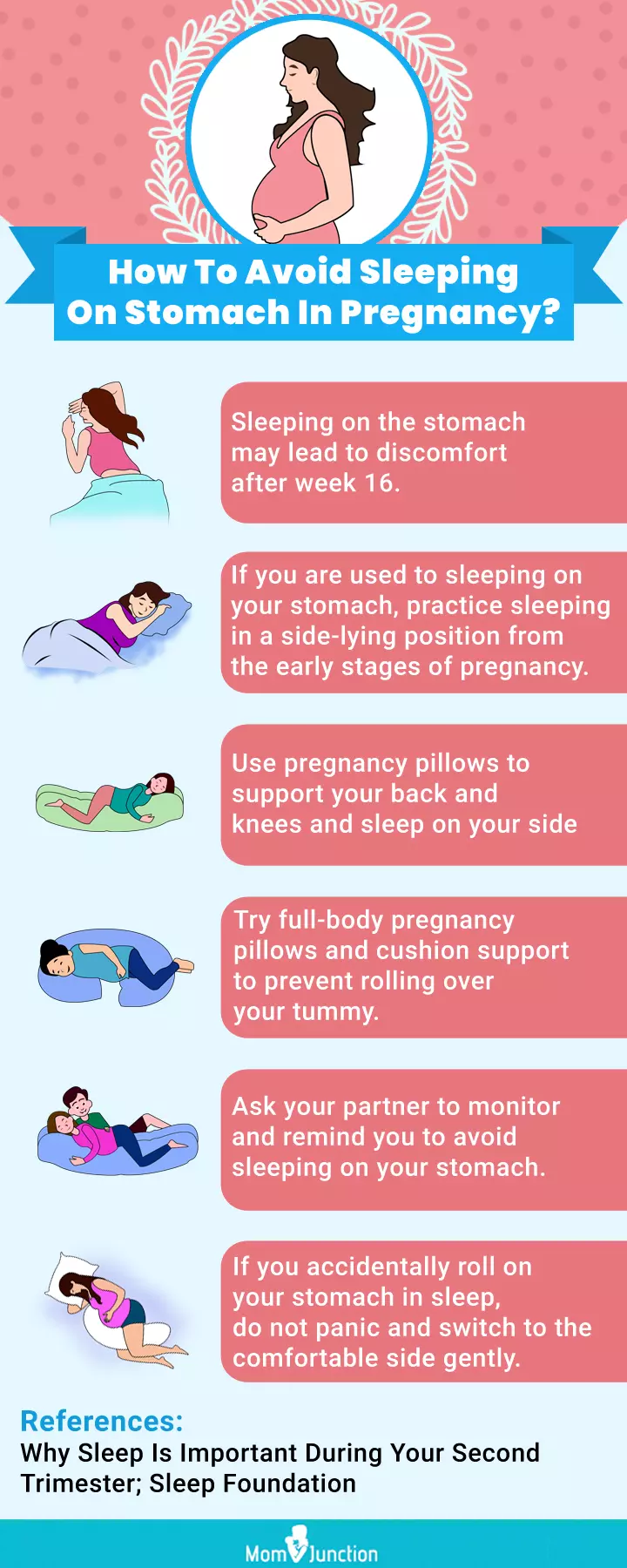
Illustration: Sleeping On Your Stomach During Pregnancy: Is It Safe?

Image: Stable Diffusion/MomJunction Design Team
Are you used to sleeping on your stomach but do you wonder if it is safe during pregnancy? Find out in this video!
Personal Experience: Source
MomJunction articles include first-hand experiences to provide you with better insights through real-life narratives. Here are the sources of personal accounts referenced in this article.
i. Pregnancy announcement and some advice.https://sunshineandasummerbreeze.blogspot.com/2015/08/pregnancy-announcement-and-some-advice.html?m=1
ii. Pregnancy / Week 20 To 28.
https://www.eatsleepwear.com/2018/06/20/pregnancy-week-20-to-28/
References:
- Sleeping Positions During Pregnancy.
https://www.urmc.rochester.edu/encyclopedia/content.aspx?contenttypeid=85&contentid=p01238 - Pregnancy and Heartburn.
https://www.urmc.rochester.edu/encyclopedia/content.aspx?ContentTypeID=134&ContentID=10 - Sleeping While Pregnant: Second Trimester.
https://www.sleepfoundation.org/pregnancy/sleeping-during-2nd-trimester - Should you sleep on your back while pregnant?
https://wexnermedical.osu.edu/blog/should-pregnant-women-avoid-sleeping-on-their-backs - Louise M. O’Brien and Jane Warland; (2014); Typical sleep positions in pregnant women.
https://www.sciencedirect.com/science/article/abs/pii/S0378378214000656 - Science Update: Sleeping position during early and mid pregnancy does not affect risk of complications, NIH-funded study suggests.
https://www.nichd.nih.gov/newsroom/news/092019-pregnancy-sleep-position - Back Pain During Pregnancy.
https://www.cedars-sinai.org/health-library/diseases-and-conditions/b/back-pain-during-pregnancy.html - Pregnancy Sleep Positions.
https://www.sleepfoundation.org/pregnancy/pregnancy-sleep-positions#:~:text - Sleeping While Pregnant: Second Trimester.
https://www.sleepfoundation.org/pregnancy/sleeping-during-2nd-trimester - How to Get Sleep During Pregnancy.
https://www.lancastergeneralhealth.org/health-hub-home/motherhood/your-pregnancy/how-to-get-sleep-during-pregnancy
Community Experiences
Join the conversation and become a part of our nurturing community! Share your stories, experiences, and insights to connect with fellow parents.
Read full bio of Dr. Irene (Eirini) Orfanoudaki
- Dr. Daniel Boyer is a practicing Doctor of medicine at Carabobo Football Club, Dallas, Texas. He did his BS from Liceo Carabobo and MD from Carabobo’s University.
 Dr. Daniel Boyer is a practicing Doctor of medicine at Carabobo Football Club, Dallas, Texas. He did his BS from Liceo Carabobo and MD from Carabobo’s University.
Dr. Daniel Boyer is a practicing Doctor of medicine at Carabobo Football Club, Dallas, Texas. He did his BS from Liceo Carabobo and MD from Carabobo’s University.
Read full bio of Rebecca Malachi
Read full bio of Swati Patwal
Read full bio of Aneesha Amonz








